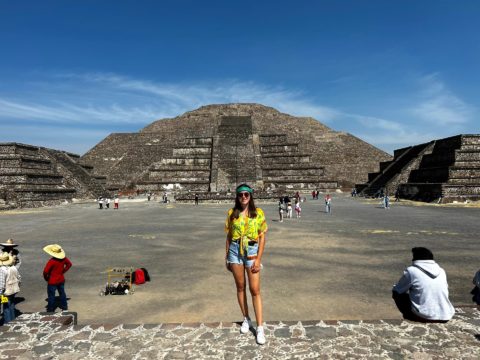Erasmus

Co-funded by the European Union's Erasmus+ programme

Erasmus + Programme
The Erasmus + programme allows students, staff and teachers to study, undergo training or do an internship abroad.
The experience allows students to improve their language skills and develop transferable skills in order to boost their career prospects on national, European and global job markets. In addition, the programme makes studying abroad more accessible as students are awarded a grant and have their tuition fees covered.
The Erasmus+ program for the higher education system contributes to creating a European higher education area aiming at several goals:
- improving and reinforcing the European dimension of higher education
- increasing student, teacher and staff mobility
- strengthening multilateral cooperation
- transparency and recognition of the acquired qualifications
- internationalizing the European higher education system
This program encourages mobility in Europe and worldwide for students (academic exchanges or internship), teachers and all staff members of higher education.
Inclusion
Inclusion stands as one of the core concerns of the new Erasmus+ programme. Its aim is to offer educational and mobility opportunities to a broader and more diverse audience by removing socio-economic barriers and promoting access for individuals from disadvantaged backgrounds, people with disabilities, and minority groups. Educational institutions and partner organizations are encouraged to design specific projects that address the special needs of these populations, allowing them to fully benefit from the advantages of Erasmus+.
The new program aims to promote equal opportunities and equal access, inclusion, diversity, and equity throughout all its actions. Organizations and participants with fewer opportunities play a central role in the Erasmus+ 2021/2027 program, which provides specific mechanisms and resources for them. When developing their projects and activities, organizations should adopt an inclusive approach to make these projects and activities accessible to various types of participants.
This priority aims to substantially increase the participation of individuals "with the least opportunities," meaning the most vulnerable, those farthest from mobility, and those who need it the most. The Erasmus+ program defines 8 obstacles to characterize these participants:
- Disabilities
- Health issues
- Obstacles related to education and training systems
- Cultural differences
- Social barriers
- Economic barriers
- Obstacles related to discrimination
- Geographic barriers
Green mobility
The environment and climate action are priorities of the EU, both today and in the future. The communication concerning the European Green Deal represents the new European growth strategy and acknowledges the crucial role of schools, training institutions, and universities in engaging with students, parents, and the wider community to discuss the necessary changes for a successful transition towards achieving climate neutrality by 2050.
Amid this current climate emergency, green mobility has, then, become a crucial priority of the Erasmus+ programme 2021/2027. The objective is to reduce the carbon footprint associated with participants' travels within Erasmus+ projects. To achieve this, the programme actively encourages the use of more environmentally friendly transportation options, such as trains or carpooling, and promotes the implementation of training and projects related to sustainability and environmental awareness. In doing so, Erasmus+ contributes to building a more environmentally conscious Europe committed to combating climate change.
This priority covers three main axes, both in terms of mobilities and cooperation projects.
Axis 1: Education for Sustainable Development. This is the cornerstone of this priority, in line with the educational objective of Erasmus+. The mobilities will enable participants to acquire knowledge about environmental issues and become genuine agents of change (e.g., by promoting resource conservation, reducing energy consumption, waste, and carbon footprint, opting for sustainable food choices and mobility, etc.).
Axis 2: Eco-responsibility. Eco-responsibility aims to reduce the environmental impact of actions related to Erasmus+ projects:
- By choosing less emitting means of transportation to limit the carbon footprint, which results in additional financial support and an increase in the grant for the stay.
- At all project levels, by integrating eco-responsibility principles from project design to implementation, in order to limit the environmental impact of various activities.
Axis 3: Development of new skills/new professions. Mobilities and cooperation actions within the program (partnerships, alliances, etc.) should enable beneficiaries to develop skills related to ecological transition (e.g., by expanding internships in renewable energy fields, agroecology, or businesses with strong Corporate Social Responsibility policies). It also involves designing training modules or courses that align with this evolution (e.g., training in energy-efficient building renovation or eco-responsible tourism careers, etc.).
Digitalisation
The COVID-19 pandemic has shed even more light on the importance of digital education for the digital transformation that Europe needs. It has particularly highlighted the increased necessity of harnessing the potential of digital technologies for teaching and learning and of developing digital skills for all. Aligned with the strategic priorities of the Digital Education Action Plan (2021-2027), this program aims to support this initiative, which seeks to engage learners, educators, socio-educational facilitators, youth, and organizations on the path to digital transformation.
Erasmus Without Paper is a digital initiative integrated into the Erasmus+ programme 2021/2027. Its goal is to streamline and modernize administrative procedures related to the mobility of students, teachers, and staff across participating higher education institutions. Through digitalization, EWP facilitates the management of applications, interinstitutional agreements, academic recognition, and mobility reports, providing a smoother and more efficient experience for all involved stakeholders. This initiative also fosters quicker and more transparent communication between institutions, thereby strengthening cooperation and international exchanges in the field of education.
In conclusion, the new priorities of the Erasmus+ programme 2021/2027 emphasize inclusion, green mobility, and the digitalization. These strategic directions aim to make the Erasmus+ programme even more open, equitable, and environmentally friendly, while simplifying administrative processes through the use of innovative digital tools. These developments underscore the European Union's continued commitment to education, training, and international mobility, with a view to enhancing social cohesion and preparing the younger generations to tackle the challenges of the future.
ICN Business School is involved in this ambitious project and takes part in different actions of the program such as the higher education student mobility, teaching mobility and academic staff mobility.
ICN Business School holds an Erasmus+ Charter for Higher Education (ECHE).
Erasmus + Charter
ICN Business School holds an Erasmus + Charter for higher education (ECHE).
Support for students with disabilities
Erasmus + also provides support to people with disabilities
Erasmus +
To find out more about the Erasmus+ Program,
especially on the higher education topic.
Mobility for students in higher education
During your studies at ICN Business School and in order to obtain your diploma, you must complete an international experience, by either taking part in an academic exchange or doing an internship abroad.
The Erasmus+ program can help you finance your European Mobility partially or entirely.
The European Commission allocates a limited number of grants per year. We invite you to get in touch with the International Relations Office to get information about academic exchanges and with the Career and Internship Office for internships.
Grants are allocated according to the available amount and according to the following terms:
Study period
From the second year of study in higher education, for a study abroad of 3 months (90 days) minimum to 12 months maximum. The host institution must be an Erasmus+ Charter for Higher Education holder and be located in one of the Erasmus+ Program participant countries.
Internship period
From the first year of study in higher education, for an internship of 2 months (60 days) minimum to 12 months maximum, in a host institution (e.g. a company) located in one of the participating countries.
Blended mobility
The possibility of including an internship period during the studying mobility (the internship must be supervised by the host institution).
It is important to note that students enrolled in a state-approved program and going on an academic exchange to a country eligible for the Erasmus grant (see list) are automatically entitled to this mobility aid, with no limit on the number of participants. For information, students in an experimental year are not eligible for this grant, nor are MIEX students, as this is not a state qualification.
As a reminder, the Erasmus grant is available for a maximum period of 12 months per study cycle.
Funding for your Erasmus+ period abroad
Group 1
Participating countries in the Erasmus+ program which have a high living cost
Denmark, Finland, Iceland, Ireland, Liechtenstein, Luxembourg, Norway, United-Kingdom (under certain conditions), Sweden, Switzerland, Germany, Austria, Belgium, France, Italy, The Netherlands
Studying Mobility : 292€
Internship Mobility : 442€
Group 2
Participating countries in the Erasmus+ program which have a medium living cost
Cyprus, Greece, Malta, Portugal, Spain, Estonia, Latvia, Czech Republic, Slovakia, Slovenia
Studying Mobility : 225€
Internship Mobility : 375€
Group 3
Group 3
Participating countries in the Erasmus+ program which have a low living cost
Hungary, Lithuania, Republic of North Macedonia, Bulgaria, Croatia, Hungary, Poland, Romania, Turkey, Serbia
Studying Mobility : 225€
Internship Mobility : 375€
Achieving a study period at a university (or other higher education institutions) leads to the recognition of ECTS credits. This allows students to continue to the next academic level of their studies.
Blended intensive programme (BIP)
The blended mobility programme, also known as BIP, in the context of Erasmus students, is an initiative aimed at providing students with the opportunity to combine virtual and physical mobility experiences within the European Union's Erasmus+ program. This program aims to enhance students' mobility experience by allowing them to benefit from the advantages of physical mobility (studying or interning abroad) as well as online learning opportunities. Short-term mobility can be divided into two parts:
- Physical mobility (in-person): Erasmus students can still participate in traditional exchanges by physically going to a foreign university or company to study or intern. This aspect of mobility allows students to experience cultural and linguistic immersion in a foreign environment.
- Virtual mobility (online): In addition to physical mobility, students can also engage in online learning activities. This can include online courses, virtual group projects, webinars, tutorials, and other educational activities accessible via the internet. This virtual component can be carried out from their home or their home university.
Mobility for teachers and university staff
The Erasmus+ Program aims to modernize and improve higher education all over Europe and in the rest of the world. Different formats of mobilities are available at ICN Business School: staff mobility for training purposes (for teaching and non-teaching staff) and staff mobility for teaching purposes (for teaching staff only).
Please be aware that the European Commission allocates a limited number of grants per year. Grants are allocated according to the available amount and according to the following terms:
The mobility must last between 2 days and 2 months (trip duration not included) in one of the Erasmus+ Program participant countries:
Staff mobility for teaching
For the outgoing mobility, a minimum of 8 teaching hours per week, in a higher education institution which must be an Erasmus+ Charter for Higher Education holder and be located in one of the participating countries. Regarding the incoming mobility for a company staff (invited staff), the 8 teaching hours are not required.
Staff mobility for training
Training/internship/observation period, in a company or in a higher education institution (including structured courses and language training).
Blended Mobility
The possibility of combining a teaching activity and a training activity during the same period. The minimum teaching time is lowered to 4 hours a week.
Please note: Conferences are ineligible for the program (neither teaching nor training).
Financing conditions for your Erasmus+ mobility:
The Erasmus+ grant is a contribution that does not necessarily covers all the costs related to your mobility project. It is highly advised that the beneficiary institutions search for other funding means (co-financing).
The European grant partially covers:
- project management (“mobility organization” budget)
- participants’ mobility, whether at a monthly rate (students) or at a daily one (staff members) depending on the destination country
- staff members’ travel costs, depending on the distance
- potential specific needs at actual costs (only for individuals with disabilities)
Special financial arrangements are made for outermost regions (overseas countries and territories).
Special financing is planned for so-called “outermost regions” areas (including overseas countries and territories).
Calculated stay costs according to the activity duration and the destination country:
Group 1
Denmark, Finland, Iceland, Ireland, Liechtenstein, Luxembourg, Norway, United-Kingdom, Sweden, Switzerland, Germany, Austria, Belgium, France, Italy, The Netherlands
Daily rate (1 day to 14 days) : 150€
Daily rate (15 days to 60 days) : 105€
Group 2
Cyprus, Greece, Malta, Portugal, Spain, Estonia, Latvia, Czech Republic, Slovakia, Slovenia
Daily rate (1 day to 14 days) : 133€
Daily rate (15 days to 60 days) : 93€
Group 3
Hungary, Lithuania, Republic of North Macedonia, Bulgaria, Croatia, Hungary, Poland, Romania, Turkey, Serbia
Daily rate (1 day to 14 days) : 116€
Daily rate (15 days to 60 days) : 81€
Distance range defines the amount allocated for travel costs:
10 to 99km
Standard travel : 28€
Green travel : 56€
100 to 499km
Standard travel : 211€
Green travel : 285€
500 to 1999km
Standard travel : 309€
Green travel : 417€
2000 to 2999km
Standard travel : 395€
Green travel : 535€
3000 to 3999km
Standard travel : 580€
Green travel : 785€
4000 to 7999km
Standard travel : 1 188€
Green travel : 1 188€
More than 8000km
Standard travel : 1735€
Green travel : 1735€
Only the one-way trip is taken into account in the distance calculation. However, the rate matches the costs related to the round trip.
Read also
Funded by the European Union. Views and opinions expressed are however those of the author(s) only and do not necessarily reflect those of the European Union or Agence Erasmus+ France / Education Formation. Neither the European Union nor the granting authority can be held responsible for them.



